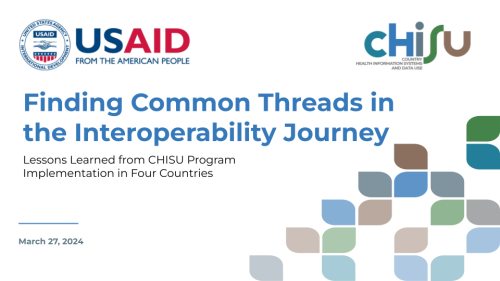Health-related data is a critical component of strong health systems, but it is often spread across multiple information systems. This siloes the data and means health workers have to spend time entering and finding it in multiple places. Interoperability is the ability of different health information systems to access, exchange, integrate, and use data coordinated through shared application interfaces and standards within and across organizational, regional, and national boundaries to provide timely and seamless information portability and optimize health outcomes.
USAID and CHISU hosted a webinar about interoperability strategies, successes, and challenges in Indonesia, Burkina Faso, Ghana, and Madagascar. During the session, we will highlight the significance of interoperability in promoting standards-based data exchange, reducing duplication of efforts, and enhancing data-driven health care policies. This webinar will include panelists from different contexts to demonstrate that there is no one straight-line approach to achieving interoperability—but there are common threads and practices that can lead to success.
This webinar was the first in a Digital Health Webinar Sub-Series as part of the larger USAID 2024 Health System Strengthening Learning Series. The USAID HSS Learning Series convenes HSS practitioners to share, learn, and use HSS evidence to inform our collective efforts to support sustainable health system strengthening and further learning under USAID's HSS Learning Agenda.
Don't have time to watch the recording? Read our summary blog for an overview.
